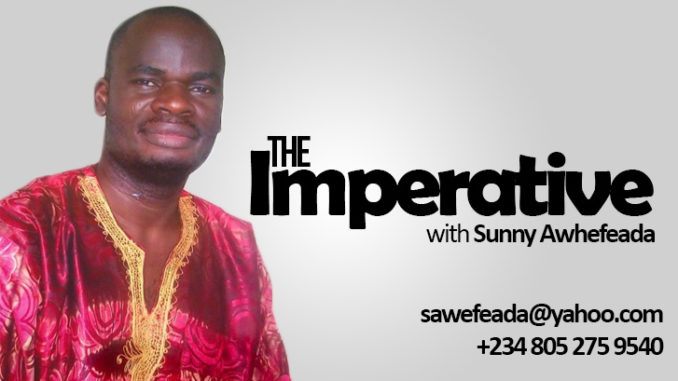
Nigeria has always perched on the horns of dilemma. When Lord Lugard, acting at the behest of the British, cobbled the many ethnic nationalities into what became Nigeria in 1914 he did so thinking that it was a convenient arrangement for the home country, Britain and the new entity christened by his girlfriend, Flora Shaw. What existed between 1900 and 1914 were two vast domains, the Northern and Sothern Protectorates, which the Berlin Conference of 1884/85 gifted Britain. Historians insist that the British were conscious of the resource famished and landlocked nature of the Northern Protectorate and feared that it could not survive on its own. On the other hand was the resource endowed Sothern Protectorate that had become the raw materials site for the Industrial Revolution of Victorian England. The British were at a dilemma over the fate of the arid North existing side by side with the prosperous South.
It was in the middle of this dilemma that the then Secretary for the Colonies, Bruce Harcourt sprung the idea of the amalgamation of both protectorates. He enunciated the ludicrous notion of the diligent Northern youth marrying the Southern lady of means. Lugard moved in from Uganda and officiated and sealed the solemnisation of what became Nigeria. Bruce Harcourt got rewarded with the naming of the new port city, after him, as Port-Harcourt, today’s capital of Rivers State.
The dilemma which goaded the British into sealing the fate of Nigeria the way they did in 1914 still haunts the country and people till date. The road leading to independence in 1960 was fraught with tension arising from distrust among the nationalists who saw themselves as ethnic champions out to secure their heirloom. With the exception of the early Nnamdi Azikiwe, no other leading nationalist was pan-Nigerian in outlook. Azikiwe was also to beat a retreat to his Igbo origin when he was confronted with tiwa tiwa in the West, where he had established a reputation as Nigeria’s leading nationalist. What dominated the nationalist movement for independence was the ironic lack of a national consensus or what approximates a national aspiration unlike the case with Kwame Nkrumah’s Gold Coast (Ghana), Nwalimu Julius Nyerere’s Tanzania and Mze Jomo Kenyatta’s Kenya.
This lack of a national ideal threw spanners in the works leading to Nigeria’s independence. That was why when, in 1963, Anthony Enahoro of the Action Group moved a motion that Nigeria’s independence should be in 1956. The North opposed it declaring that it was not practicable. Thus while two regions, the West and the East, became self-governing in 1957, the North remained tied to the apron string of Britain. But when independence finally came in 1960, the British manipulated the process into handing over political power to the docile North and thus validating Bruce Harcourt’s matrimonial construct of the North as husband and the South as wife.
That dilemma has remained a sour point for Nigeria. The turbulence that ruptured the newly independent country from around 1962, the period of Obafemi Awolowo’s arrest for treason, through the raging inferno of operation wetie up to that bloody Saturday of 15th January 1966. The civil war of 1967 to 1970, the bloody military coups and the attendant military dictatorship, the June 12 crisis, were all cataracts in our turbulent post-colonial experience birthed by the dilemma arising from the abysmal absence of a national aspiration.
When the present dispensation took off in 1999, many had thought that the many years of collective adversity would foster a semblance of a national ideal which will erase the dilemma in our quest for nationhood. Yet, a critical reckoning of the tumultuous events leading to the new era in 1999 easily exposes cracks. The June 12 crisis which was the dominant historical catalyst of that period was seen largely as a Yoruba cause. The Northern hegemony saw the struggle as a means to entrench its domination. The Igbo elite saw it as payback time for the Yoruba for their role in the civil war that decimated the former. Only the minorities, from the Niger Delta and the Middle Belt, were found at the barricades to reclaim and revalidate the June 12 mandate.
With the return to civilian rule in 1999, power once again went to the same forces that negated the ideals of nationhood and promoted cabal interest. Obasanjo who was in the saddle for eight years was a puppet for half of those years. He transformed into a puppeteer and installed Umaru Yar’ Adua who demonstrated some nationalist fervor. Death undid him. Goodluck Jonathan who succeeded him turned out to be a disaster and it was his failure that engendered the present maigaurd presidency.
As 2019 draws nigh our national dilemma confronts us quite starkly. The disturbing question is, “which way Nigeria”. The ills confronting Nigeria are legion and the present crops of wheeler-dealer politricktians have neither shown the capacity nor the will to resolve the impasse. The knotty issue of restructuring by way of embracing the spirit and letters of federalism remains the nation’s biggest dilemma. The maiguard presidency superciliously dismisses the idea even as its subaltern manifestation now thinks only of how to dance shaku-shaku. The sad reality is that 2019 stealthily creeping in on us that it affords us no opportunity to tackle our national dilemma. We are just moving in circles.
END

Be the first to comment